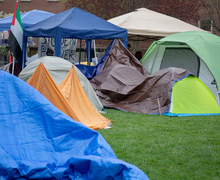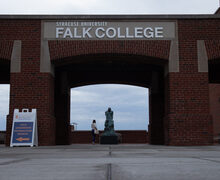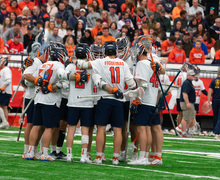Barillari: Students gain widely applicable skills from well-rounded liberal arts educations
As an 18-year-old college freshman, I was positive I wanted to be a senator. I was eager to begin my courses in understanding the American electoral process and the critical issues affecting the country I someday wished to serve. And yet, I also found myself in Astronomy 101 – a direct result of Syracuse University’s liberal arts core requirements.
Though the past several years of observing Washington politics has changed my postgraduate prospects, a question which arose that first day has always remained: Is there any significance in my past efforts to understand which moon phase is a waning crescent?
As a matter of fact, there is.
Scholars are arguing that overall higher education is being negatively affected by the “tough economy and continually dwindling job prospects,” which are causing many college students to develop “a laser-like focus on preparing themselves for the job market,” according to a Sept. 6 article on The Huffington Post’s college blog.
In the article, Barry Schwartz, a professor of social theory and social action at Swarthmore College, states that though students want to specialize from the start of their collegiate experience in order to enhance career opportunities in the future, the consequence is a more general education and the liberal arts are not being taken seriously – a situation many employers are also rightly finding problematic.
The American collegiate experience is increasingly adapting to the gravitation of more students to seek single career-focused educations. But, this philosophy is arguably concerning for two reasons: (1) The failure of students to learn the variety of skills and areas of knowledge necessary to compete in today’s highly globalized, demanding society, and (2) the possible stifling of hiring opportunities and international appeal in the job market.
As it turns out, there is worth in the concept of being “well-rounded.” Majoring in, or applying some academic effort to, the liberal arts is actually more beneficial than many commonly believe – a concept SU students should consider.
According to Education Portal’s Education Insider news blog, the liberal arts refers to subjects like literature, history, languages, philosophy and mathematics. These areas of study differ from majors like business or engineering because they do not have a direct corresponding career field.
But because the liberal arts disciplines are less narrowly focused, students are more encouraged to pick up widely applicable skills including communication proficiency, reading comprehension and analytical abilities, according to the site. This often equates to students feeling less “locked” in a single career field.
With liberal arts studies also comes the garnering of cultural knowledge so imperative, but unfortunately lacking, in today’s general public.
Unlike in the United States where the post-recession higher education focus is increasingly shifting toward specification, “elsewhere in the world, there is a growing emphasis on broader learning as an economic necessity,” according to a June Associated Press article.
This article has become a part of the ongoing international conversation concerning the liberal arts.
According to the piece, which consults institutions of higher education throughout the world, foreign companies are increasingly seeking students from the United States with liberal arts backgrounds because they demonstrate the skills listed above, which employers now demand.
Across the globe, companies are seeking more than “job-fillers,” according to the article. “They think the biggest innovations come from graduates who are well-rounded – from empathetic engineers, say, or tech-savvy anthropologists.”
Though pouring 15 credits worth of time and energy into my natural sciences core requirements was frustrating as an underclassman, being knowledgeable about more than how the American legislative process functions has allowed me to widen my current postgraduate employment search. Especially since my prospective senatorial days have come to a close.
And, who knows, maybe I’ll end up putting my astronomy skills to work after all. Tonight, expect a first quarter moon.
Rachael Barillari is a senior political science and Middle Eastern studies major. Her column appears weekly. She can be reached at [email protected] and followed on Twitter at @R_Barillari.
Published on September 12, 2013 at 2:03 am




